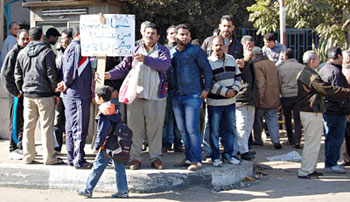

Vol. 76/No. 48 December 31, 2012

|
| Picket line at Eastern Tobacco in Cairo, Egypt. Some 13,000 workers employed at state-owned company won their demands Dec. 18, after two-day strike. Even if anti-democratic constitution passes, workers won’t willingly give up political space won in struggle over last few years. |
Egyptian President Mohamed Morsi’s Muslim Brotherhood, Egypt’s largest and best organized capitalist party, and other Islamist groups are leading the campaign for a “yes” vote. Heterogeneous forces opposing the referendum include bourgeois, social democratic and other middle-class opposition parties; many trade unions; and Coptic Christian groups.
Television advertisements backing the constitution claim that it would guarantee workers a minimum wage, set a maximum wage that would lessen the gap between rich and poor, and guarantee union rights.
The Egyptian Federation of Independent Trade Unions answered the claims in a video produced by the Moriseen Center in Cairo, noting that the constitution does not say how much the minimum wage would be and would tie it to production, not inflation. The “maximum wage” section includes other clauses that render it meaningless. The constitution also stipulates that only one union is allowed per “profession,” in effect denying recognition to many unions formed in the fight against the Mubarak dictatorship that challenge the government-funded Egyptian Trade Union Federation.
Morsi insisted on scheduling the vote to begin just two weeks after a Muslim Brotherhood-dominated Constituent Assembly approved the draft, leaving little time for discussion or debate. On Nov. 22 the president issued a decree saying that until a new constitution was approved and government elected his decisions were law and could not be appealed.
Both supporters and opponents of the authoritarian moves organized demonstrations across the country, at times battling each other. Both sides have organized actions as large as 100,000 or more. By Dec. 14 at least 10 people had been killed and 700 wounded, according to the Associated Press.
The Army’s Supreme Military Council, which ruled the country for 18 months after removing dictator Hosni Mubarak from office in February 2011, following several weeks of mass demonstrations, has tried to portray itself as standing above the fray.
The opposition consists of “counterrevolutionary forces aimed at destroying the gains of the revolution,” Morsi claimed Dec. 1.
After most of the country’s judges refused to supervise the referendum, Morsi announced it would take place in two stages: in half the electoral districts Dec. 15 and in the remainder Dec. 22. Most of the judges are Mubarak appointees.
Unions face a ‘war on workers’
“We call for the workers to vote ‘no,’” Fatma Ramadan, a leader of the independent union federation told the Militant. “The rights of the workers are being stolen from them following the same policies of Mubarak.“We are facing a war against the workers from a government that is formed from the businessmen and is biased toward their interests, not the country’s,” she said. “The unions have members of all spectrums of political life in Egypt, and yes, supporters of the Muslim Brotherhood as well. But they are changing their mind slowly after seeing the latest decisions made by President Morsi.”
The constitution was voted down in Cairo, with 57 percent against, and in Gharbiya governorate by 52.1 percent. The largest city in Gharbiya is Mahalla El Kubra, a center of Egypt’s textile industry, with tens of thousands of factory workers and a history of union struggles and opposition to the Mubarak dictatorship and the military regime that followed.
“The vote here was a resounding ‘no,’” Ibrahim Sayed Habib, a former textile worker and currently an official of the textile workers union at Misr Textiles, told the Militant by phone from Mahalla.
Habib pointed to the impact of the economic crisis on workers’ opposition to the constitution. “Prices have been going up substantially,” he said. “Wage raises have been refused by the Muslim Brotherhood and the government.”
Supporters of the constitution often cited the need for “stability” to explain why they would vote in favor. But most people did not vote.
No matter how the vote turns out, workers are not about to willingly give up the political space to organize and fight for their interests that was won in struggle over the last several years.
Bashar Abu Saifan in Beirut and Georges Mehrabian in Athens, Greece, contributed to this article.
Related articles:
‘Right-to-work’ laws can’t stop fight ahead to build unions
On the Picket Line
Front page (for this issue) |
Home |
Text-version home